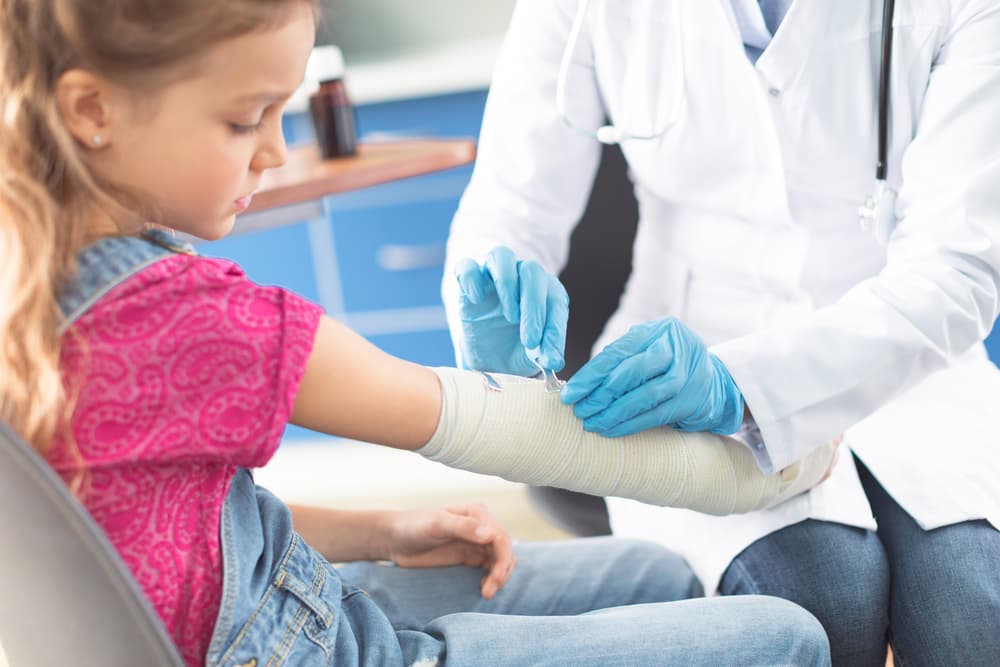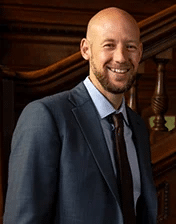The last thing you want to hear from someone on the other end of the phone is that your child is hurt. All you can do is hope that it is not serious and then wonder what caused your child’s injury. Once you figure out what happened and you know that your child is getting the care he or she needs, you can work on the legal aspects of the case.
That’s when you need to call the Duluth child injury lawyers at Nicolet Law Accident & Injury Lawyers. We’re here for you when someone injures your child. We recognize the value of family—several Nicolet siblings and other family members work together here.
We know how to come together behind those whose children found themselves injured due to someone else’s negligence. We’re here to help you. Call us today.
Injured in Duluth? Get Nicolet.
Who Is Responsible for My Child’s Injuries?

Those who may bear the responsibility for your child’s injuries include:
- Pet owners.
- Property owners.
- Health care professionals.
- School officials.
- Swimming pool owners.
- Toy manufacturers.
- Those who sexually or physically abused the child.
- Playground equipment manufacturers.
- Sports coaches.
- Sports players.
- Other parents.
- Those responsible for lead paint exposure.
- Those responsible for poison exposure.
- A motorist who caused an accident.
- A bicyclist who caused an accident.
- Those responsible for causing wrongful death.
Often, determining who is responsible for a child’s injury is complicated. For example, if your child suffers an accident on faulty playground equipment, is the manufacturer solely or partly liable? Is a teacher who noticed defective equipment but let the children play on it anyway liable? Is the school liable? A Duluth child injury lawyer can help determine who should pay damages for your child. Contact Nicolet Law Accident & Injury Lawyers today to discuss your legal options and who to pursue damages against.
Nicolet Law no longer handles Disability or Bankruptcy cases.
How Does a Minor Child Recover Damages in Duluth?

Since a child under the age of 18 cannot file a lawsuit, a parent or guardian can file the lawsuit on the child’s behalf. A child is entitled to the same types of damages as an adult. The court also looks to see if the child behaved appropriately for his or her age.
In some cases, the laws for children are different. For example, if an adult trespasses onto a property with an unfenced pool and drowns, the family usually cannot recover damages since the adult trespassed. However, if a child trespasses in the same situation, the court is more likely to hold the property owner liable since he or she knew or should have known that the pool would attract a child and would pose a danger if left unfenced and/or unlocked.
Damages a Child Might Recover for Injuries
A child can recover compensation for injuries, but the parent or guardian must place the compensation, less for medical expenses, into a trust or separate account for the child. The child can recover the same damages, including economic damages, non-economic damages, and punitive damages if applicable.
Economic Damages. Sometimes called special damages, economic damages have a monetary value. The court orders special damages in an attempt to make the child whole again.
Economic damages include:
- Medical Expenses. Your child could recover past medical expenses for injuries sustained in the incident. These cover medical expenses from the time of the incident through a settlement or a trial award. This can include future medical expenses for those that the child will incur after a trial award or a settlement. Past and future medical expenses include surgeries, follow-up appointments, medical appointments related to the injuries and surgeries, physical therapy, occupational therapy, and cognitive and other psychological therapies.
- Wages. If a child is of working age and can no longer work because of accident injuries, he or she might not recover much in the way of past lost wages—those due from the time of the accident through the time of a settlement or a trial award. However, if doctors expect that your child’s injuries will lead to long-term or permanent disabilities that prevent your child from holding gainful employment, he or she could recover future lost income. Even a child under the age of 16 could recover future lost wages if doctors believe that the disabilities an accident caused will prevent the child from ever holding gainful employment.
- Personal Property. If another person's negligence destroyed a child's personal property, you could recover compensation to repair or replace it, including phones, computers, bicycles, clothing, and for older children, the child’s vehicle.
- End-of-Life Expenses. If your child dies because of someone’s negligence, you may be entitled to collect compensation for funeral expenses, burial expenses, and/or cremation expenses.
Non-Economic Damages
Sometimes referred to as general damages, non-economic damages do not have a monetary value since you can never put a price on emotions and feelings. The court orders the defendant to pay non-economic damages as a way to make a person whole again. While the money does not make a child physically whole again or bring back a child who died from negligence, it does help the parents financially.
Non-economic damages include:
- Pain and suffering, including emotional distress.
- Emotional distress if a parent lost a child in an accident or incident.
- Loss of quality of life if the child needs to take medications, use ambulatory aids, or otherwise has to change his or her lifestyle because of an accident.
- Loss of companionship if the child can no longer enjoy and/or take part in family activities and events.
- Loss of use of a body part, such as a hand or foot.
- Loss of use of a bodily function, such as the child’s eyesight.
- Amputation, whether directly because of accident injuries or because of secondary injuries such as infections.
- Excessive scarring and/or disfigurement.
Injuries a Child Could Sustain

The injuries a child could sustain depend on the type of incident, from faulty toy or playground equipment to an automobile accident.
Injuries might include:
- Bumps, bruises, scratches, cuts, and scrapes.
- Gouges from animal bites.
- Face and eye injuries.
- Internal injuries from eating something a child should not eat.
- Internal injuries from car wrecks and other major accidents.
- Road rash.
- Head, neck, and shoulder injuries.
- Traumatic brain injuries.
- Simple and compound fractures.
- Strains, sprains, pulled muscles, torn muscles, and other soft tissue injuries.
- Back and spinal cord injuries.
Your child could also suffer from secondary injuries, such as open wounds becoming infected. The defendant could also bear the responsibility for these injuries. Additionally, if your child has existing conditions and the accident or incident exacerbates them, the defendant could hold responsibility for the extra medical attention your child needs for them. If not for the accident or incident injuries, your child would not have the additional pain and suffering.
Why You Should Retain a Duluth Child Injury Lawyer
You might think it is easier and cheaper to settle with an insurance company without retaining an attorney. However, people that attempt to settle their own cases may leave money on the table. Insurance companies are in business to make a profit. In any case, the money they have to pay out decreases their profits. They also know that most people do not know the laws and may use this to trick you into saying something that they can use to “convince” you that the pittance they offer you is all they can offer—or worse, to deny your claim.
At Nicolet Law Accident & Injury Lawyers, our Duluth child injury attorneys know the tricks the insurance companies use, so they cannot twist what we say, use it to deny your claim, or offer a pittance that might not cover your medical expenses. Insurance companies also know that when you retain an attorney, they have a higher risk of heading to a courtroom if you do not believe their offer is fair and reasonable. They would rather settle, because going to court costs the insurance companies a lot of money—sometimes even more than a fair and reasonable settlement because they must pay their attorneys to defend their position.
Contact Nicolet Law Accident & Injury Lawyers today to discuss your legal options.
The Insurance Company Sent Me Documents to Sign
Refrain from signing anything or agreeing to anything over the phone without speaking to an attorney first. If you sign a medical release or a settlement and it is not for enough money, you might not have enough to pay medical expenses.
Additionally, if your child sustained injuries that caused or will cause long-term or permanent disabilities, the layperson cannot estimate how much the child’s medical care will cost over the child’s lifetime—especially if your child is very young. At Nicolet Law Accident & Injury Lawyers, our child injury attorneys work with medical professionals and rely on our experience to help determine a fair amount of compensation in these types of cases. We can work to get you the compensation you deserve so that your child can receive the medical attention he or she needs, as long as the incident or accident caused the injuries.
How to Determine Compensation for Long-Term or Permanent Disabilities
One of the hardest things to do is predict how much a person’s medical expenses will be in the future. It is often more difficult for a child since he or she is not fully grown. Our child injury attorneys at Nicolet Law Accident & Injury Lawyers know what insurance companies normally pay for certain injuries; plus we can enlist the help of medical professionals to determine the care your child will need.
Additionally, we figure inflation of medical expenses into the amount we request to cover future medical expenses. In some cases, we might have to call in expert witnesses even if we plan on settling instead of litigating—simply because we need to give the insurance company that last little push before moving forward with litigation. In many cases, the insurance company will come up with a fair and reasonable amount when you have an expert witness showing that future medical expenses could run as high as you are asking.
If the Insurance Company Refuses a Fair and Reasonable Offer
You have two choices: You can accept the last offer the insurance company makes, or you can move to litigation. As soon as you retain Nicolet Law Accident & Injury Lawyers and tell our Duluth child injury lawyers that you don’t think the settlement offer is fair, we can prepare the complaint, file it in the court, and serve the defendant(s) with the summons and complaint to get your case started.
Duluth Child injury FAQ
What are some common causes of child injury?
Sadly, children are frequently injured because of another’s negligence. Some of these are the same acts that harm adults, but children more commonly experience others. Children are naturally busy and curious, but they often lack the judgment and maturity to handle risky situations.
The leading causes of injury vary based on age, but many accidents can injure a child, including:
- Motor vehicle accidents. These may happen when the child is a passenger or a car hits a young pedestrian. The Minnesota car seat law requires that children under the age of eight or shorter than 4’9” ride in a car seat or booster seat. Experts recommend that children stay in a rear-facing child safety seat for as long as possible. Once they grow out of that, they can switch to a front-facing harnessed restraint and then to a booster seat.
- Falls are the leading cause of non-fatal harm in children, accounting for about 8,000 visits to the emergency room every day for children 19 years old and under.
- Drowning is the leading cause of unintentional injury-related death among children aged one to four years old. Most of these drownings occur in bathtubs, residential swimming pools, and open-water sites such as rivers, lakes, or the ocean. According to the National Safety Council, drowning is a leading cause of death among children ages five and younger. Young children are the most susceptible to pool accidents. Most drownings and near-drownings happen when a child falls or climbs in a pool without supervision. In some cases, the accident occurred because a pool owner failed to adequately secure a pool by fencing it and repairing broken gates as needed. In addition, if a pool owner has not maintained the swimming pool drain properly, a child may become entrapped by the suction.
- Suffocation is the leading cause of unintentional injury-related death among children under the age of one. It often occurs in cribs and is a leading cause of sudden unexpected infant death. Improper use of infant sitting devices, such as car seats, swings, and bouncers can also cause injuries, especially when used for routine sleep.
- About 100 children die almost every year because of a bicycle-related accident, and bicycle accidents leave 254,000 children injured.
- School bus accidents
- Each year about 2,000 children die from a home injury. These often involve falls, choking, suffocation, fire, burns, poisoning, and firearms. They are most common in children aged 14 and under.
- Choking on toys, small objects, and food
- Dog attacks More than half of all dog bite victims are children. Many young children are naturally attracted to dogs and may not recognize signs of aggression. As a result, children are most frequently bitten in the face, head, and neck. Children injured in dog attacks may require reconstructive surgery and other long-term medical care.
- Falls on playground equipment or at home
- Concussions resulting from organized and recreational sports
In many states, including Minnesota, a child tragedy often leads to new laws for the protection of children.
For example, Laela’s Law was named after a young Minneapolis girl who fell from a window. The law requires the attachment of safety screens, guards, or fall prevention devices in new or replacement windows above the 1st story in most apartment and multi-dwelling unit buildings in Minnesota.
What are common types of child injuries?
Every parent deals with minor injuries with a kiss and a Band-Aid.
However, more severe injuries can also occur, including:
- Traumatic brain injuries
- Spinal cord damages
- Internal bleeding and organ damage
- Sprains
- Broken or fractured bones
- Soft tissue injuries
- Burns
- Deep lacerations
- Shaken baby syndrome
- Injuries to the knees, legs, arms, and hands
Who may be liable for a child injury?
Adults must act with reasonable care concerning the safety of children. Caring for children requires anticipation of children’s curiosity and often-unexpected actions. Therefore, adults need to pay attention. Failure to take reasonable safety precautions may lead to liability.
Often, in child injury claims, more than one person or entity may be liable. Liable parties may include:
- School teachers, administrators, officials, and other staff members
- Daycare providers. Some daycare programs and facilities are excellent. However, unlicensed or substandard daycare centers may be ill-equipped and have untrained or poorly supervised staff.
- Children are often injured getting on or off a school bus, or during a trip. Depending on the circumstances, the bus company, the bus driver, or even the school district itself could be liable.
- Property owners or possessors are liable under the legal theory of premises liability. The basic rules of negligence and premises liability apply to children. For example, if a property owner has not locked a pool gate or securely guarded the area and a child falls in the pool and drowns, the property owner may be liable. This is true even if the child was there without permission. A property owner or possessor must warn children if they know or should know children may be on the property. In some cases, the doctrine of attractive nuisance may apply, which refers to something on a person’s property that might lure a child into a dangerous situation, such as a discarded refrigerator or construction equipment.
- Those who design or manufacture defective toys are liable for the resulting injuries.
- The owners of amusement parks and playgrounds are responsible for the condition and operation of the rides and playground equipment.
- Dog or other pet owners
- Park districts and parks and recreation departments
- Those responsible for team sports
- Motorists
What is the law regarding child injuries in Minnesota?
Child personal injury cases are, in many ways, similar to such cases involving adults. However, the significance of the injury is different for children because the consequences may alter their whole future. To recover compensation, the plaintiff must establish the negligence of the other party.
A minor child can’t file a lawsuit in their own name. However, a parent or a representative approved by the court to act as a guardian of the child’s property rights can file a claim on their behalf. If the parents are not in agreement, the court may appoint a guardian ad litem to pursue the lawsuit on behalf of the child.
The parents or legal guardians may also have a claim to recover the reasonable and necessary medical expenses and other expenses related to the injury they may incur for a minor child.
Minnesota law requires court approval of any settlement of a child injury case. After payment of medical bills and attorneys’ fees, the settlement funds must be held in a court-approved financial institution.
Generally, the funds are distributed to the child when they reach the age of majority. If the child needs some of the money before that time, the parents or guardian must file a formal petition with the court. Overall, the court wants to ensure that the settlement is in the best interests of the child.
What types of damages could my child recover?
Determining the value of damages for a child’s injury may be particularly complex. Your attorney may work with medical and economic experts to ensure full and fair compensation for the child and their parents.
First, it is vital to establish the ongoing physical and emotional impact of the harm. Generally, the goal is to provide compensation for the physical, mental, emotional, and other forms of harm suffered.
Economic damages are out-of-pocket losses that result from the injury. These include medical expenses as well as other monetary losses. Injured children can also pursue recovery for any decreased earning capacity or loss of future earnings that they will experience after reaching 18 years old.
Non-economic damages, sometimes referred to as general damages, include pain, suffering, and mental anguish. These are highly subjective and more challenging to value. The court may award punitive damages if the injured party can show clear and convincing evidence that the person at fault showed a “deliberate disregard for the rights or safety of others.”
The injury may also impact the family finances. For example, a parent may have to stop working, either temporarily or permanently, to care for the child and attend medical appointments.
What is the deadline for filing a lawsuit?
Minnesota, like every state, imposes various time limits on different types of claims. Determining the statute of limitations is complicated, especially when it involves a minor child. Therefore, you must speak with a knowledgeable attorney and make sure any potential claim is filed before the time limit in which to begin a lawsuit has expired.
What evidence may support a child injury case?
Building a strong case requires strong evidence to prove your claim. Evidence can establish who is liable, the extent of the injury, and the amount of damages. Therefore, it is important to gather and preserve as much evidence as possible.
Evidence may include:
- Proof of damages: To receive proper compensation, you must prove damages. Keep track of all of the medical records and bills related to the injury. These typically include emergency services, hospital stays, surgery, rehabilitation, adaptive devices, and mental health services. If your child had a part-time job, they might be entitled to lost wages. In addition, you may have lost wages because you had to care for your child or take them to appointments.
- Photo evidence: If possible, take pictures of your child’s accident and the scene of the accident. Others may have videotaped the accident, and public places often have surveillance cameras. Collect video evidence as soon as you can because after a short time surveillance footage may be erased. Also, take pictures of your child’s injuries throughout the recovery period.
- Witnesses: If anyone witnessed the accident, be sure to obtain their contact information. It may be difficult to track them down weeks or months later. Ask potential witnesses to write down what they saw and heard and sign and date their statements.
- Journal entries: The consequences of the injury may last a long time. It is easy to forget important details concerning how the injury has changed your child’s day-to-day life and yours. A journal recording your child’s treatment, recovery, and behavioral changes can help support claims for pain and suffering.
- Stay away from social media: It may be hard to resist posting on social media about your child’s accident or injury, but such posts may prove detrimental to your case.
Statute of Limitations for Duluth Child Injury

If you need to file a lawsuit, you have up to six years in Minnesota in many cases. However, when a child is involved, the child can file his or her own lawsuit once he or she turns 18 years of age. At that time, the child has one year from his or her 18th birthday to file a personal injury lawsuit.
However, you should see a child injury lawyer in Duluth as soon after the accident as possible. Too many things could happen between today and the day the child turns 18. Companies could go out of business. People forget the facts about the accident or incident. Evidence disappears.
Additionally, you could face extensive medical expenses before your child turns 18. Your insurance might not be enough to cover those expenses. The money you get from the settlement or a trial award can help keep your family from spending your savings on medical care.
We can review your child’s case and let you know whether we believe you should attempt to recover damages now or let your child recover damages later. One of the main factors in determining the best time is the child’s age.
If your child sustained injuries in Duluth, whether birth injuries, vehicle accident injuries, or at school or because of faulty toys or playground equipment, contact Nicolet Law Accident & Injury Lawyers in Duluth at (218) 217-0698 for your free case evaluation.